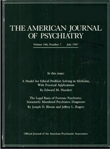Posttraumatic stress disorder associated with peacekeeping duty in Somalia for U.S. military personnel [published erratum appears in Am J Psychiatry 1997 May;154(5):722]
Abstract
OBJECTIVE: The end of the Cold War has marked a period when the U.S. military is asked to secure peace under conditions in which peace is tenuous, yet the need for resolution of the conflict is great. Combat- trained soldiers are highly visible and are exposed to threats to their lives, yet are asked to exhibit restraint and neutrality. The psychiatric consequences of peace-keeping duty under these conflicting and volatile conditions have been underresearched. The authors examined the prevalence of posttraumatic stress disorder (PTSD) associated with exposure to peacekeeping duty in Somalia. METHOD: A large cohort of active duty personnel deployed to Somalia (N = 3,461) were surveyed approximately 5 months after their return to the United States. A variety of military service characteristics and exposure variables and PTSD symptoms were examined. RESULTS: Eight percent of peacekeepers were found to meet diagnostic criteria for PTSD. PTSD symptom severity was best predicted by the rewards of military service, war zone stress, and frustrations with peacekeeping (e.g., restrictive rules of engagement). CONCLUSIONS: It is likely that the mission in Somalia represents a new paradigm of dangerous military operations for the United States. These data suggest that peacekeeping may be difficult to reconcile for some combat-trained soldiers and can create a risk for PTSD.



